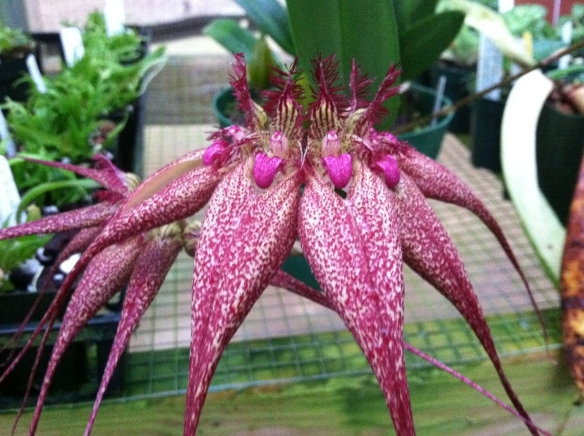When you see this orchid flower you may wonder if it is it real. It certainly doesn’t resemble any flowers you see in your day to day life, but there is something intriguing about it.Maybe it is the bold contrast of pink spotting on the cream background or the tapering slender flow of the flowers, possibly the unusually fimbriation on the top segment of the flower, or the gently bobbing hinged lip. Whatever it is about this flower that attracts or repels you, you certainly must agree it grabs your attention. Cirrhopetalum Lovely Elizabeth is a hybrid of Cirr. Elizabeth Anne crossed with Cirr. rothschildianum. It blooms only once a year, but because it makes several growths each year when grown well, it is capable of putting on quite a show!
Required Light: In the greenhouse I use 50% shade cloth and have it in a spot where it gets mostly morning and afternoon sun but not Midday. Under artificial lights like T5 fluorescents I recommend it be 16” underneath at least two 4 foot T5 bulbs.
Temperature: This orchid prefers night-time temperatures to be between 65° F – 75° F. Daytime temperatures can easily reach the mid 90’s without causing a problem.
Humidity: Best kept at 60% RH or higher.
Required Watering: Depending on environmental factors, twice a week or more under normal conditions. More waterings are generally necessary when it is hotter in the growing environment. Clean water is preferred by this orchid genus of orchids so a Reverse Osmosis water filter may be necessary depending on your water quality.
Fertilizer: Should be applied at ¼ strength weekly. I prefer to use the Grow More brand of fertilizers.
Potting: Should be done annually as you see new roots just starting to emerge from the newest pseudoblulbs. I use a mixture of 4 parts coconut husk chips, 2 parts #4 Perlite, and 1 part Hydroton. Also I prefer plastic pots as they will not dry out as fast allowing the roots to stay comfortably moist.
To learn more about orchids and orchid growing contact the American Orchid Society or your local Orchid Society.

